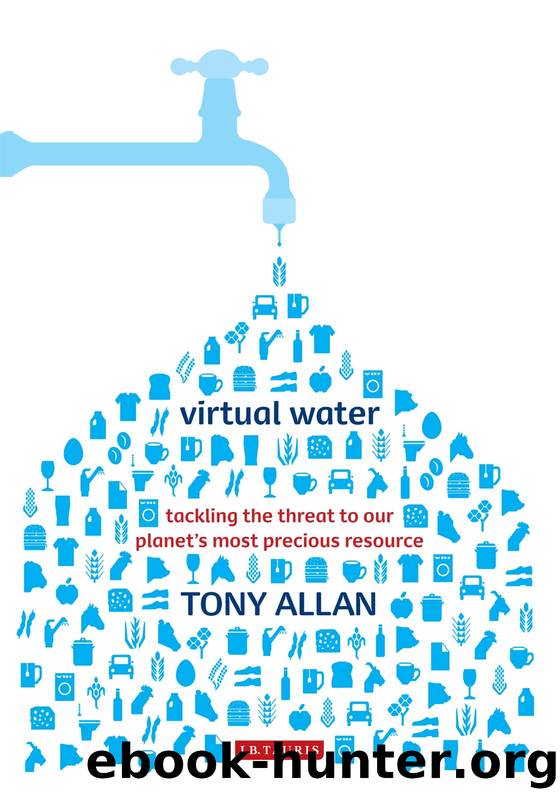Virtual Water by Tony Allan

Author:Tony Allan [Allan, Tony]
Language: eng
Format: epub
ISBN: 9780857730503
Publisher: Bloomsbury Publishing
PART 1
China: our inscrutable saviour
For a nation culturally dogged by the oft-imposed epithet of its ideology, Communist China is deeply pragmatic. This works to the great benefit of all of us, particularly when it comes to water management.
Size matters
China matters. As Charles de Gaulle famously observed, âChina is a big country, inhabited by a lot of Chinese.â That the statistic is so well known sometimes blinds us to its significance: one in five people live in China. With 1.3 billion thirsty people, the way China consumes water and water-intensive commodities is more important than the policies of any one other nation. What makes China matter even more is that its almost unique political and civic structure means the leadership quickly converts ideas into action. China gets things done. Fast. And water policy is no exception.
The national diet
The forbidden state
Commonly known for its unknowable nature, China was even more mysterious than usual to observers immediately after the Communist Party seized power in 1949. For three decades under Chairman Mao Zedong, China was closed. The history of those years is defined by the caprices and prejudices of whoever happens to be recounting it. State oppression and violence tinge most accounts of the âGreat Leap Forwardâ and the âCultural Revolutionâ, but it may be many years before an approximation of objective truth is reached. That said, the figures do show us one thing very clearly. Within three decades, the Chinese population increased by almost 80 per cent. Whatever else happened behind the thirty-year veil of secrecy, China certainly developed a weight problem.
Slim fast
And so it was that in 1979, the Chinese government told its populace that it must think the unthinkable. They were asked to reduce their family size and make a present, specific, personal sacrifice for a future, abstract, collective good. It was an experiment like no other in human history, and could have proven disastrous. Yet, despite those who argue that human nature cannot be trumped by legislation, Chinaâs one-child family policy was a success in terms of adjustment to an otherwise impossible dilemma. As I said earlier, it is the single greatest act of water conservation our planet has ever seen. The population growth avoided would have been enough to repopulate the US (with Canada and Greenland thrown in for good measure). Thatâs a lot of water (and energy) saved. We might do well to remember this incredible contribution to global resource security the next time we criticise China for lacklustre commitments to curbing global warming.
The most remarkable thing about the one-child family policy is that it flies directly in the face of the political norm. For the policy ensures that a future generation reaps the benefit of the current generationâs sacrifice. Often in politics, the future is sacrificed for the sake of the moment. Consider, but briefly, current approaches of industrialised countries to climate change. Political action has lagged feebly behind the science. Only once there was a notable groundswell of public, popular opinion could politicians feel sufficiently emboldened to expend precious political capital on even discussing the issue seriously.
Download
This site does not store any files on its server. We only index and link to content provided by other sites. Please contact the content providers to delete copyright contents if any and email us, we'll remove relevant links or contents immediately.
Harry Potter and the Goblet Of Fire by J.K. Rowling(3046)
Never by Ken Follett(2880)
Shadow of Night by Deborah Harkness(2718)
Ogilvy on Advertising by David Ogilvy(2682)
Zero to IPO: Over $1 Trillion of Actionable Advice from the World's Most Successful Entrepreneurs by Frederic Kerrest(2395)
The Man Who Died Twice by Richard Osman(2300)
Machine Learning at Scale with H2O by Gregory Keys | David Whiting(2291)
Book of Life by Deborah Harkness(2263)
How Proust Can Change Your Life by Alain De Botton(2261)
My Brilliant Friend by Elena Ferrante(2224)
0041152001443424520 .pdf by Unknown(2220)
The Tipping Point by Malcolm Gladwell(2204)
How to Pay Zero Taxes, 2018 by Jeff A. Schnepper(2100)
Will by Will Smith(2042)
Purple Hibiscus by Chimamanda Ngozi Adichie(1981)
Hooked: A Dark, Contemporary Romance (Never After Series) by Emily McIntire(1959)
Borders by unknow(1785)
Rationality by Steven Pinker(1765)
Daughter of Smoke and Bone by Laini Taylor(1744)
